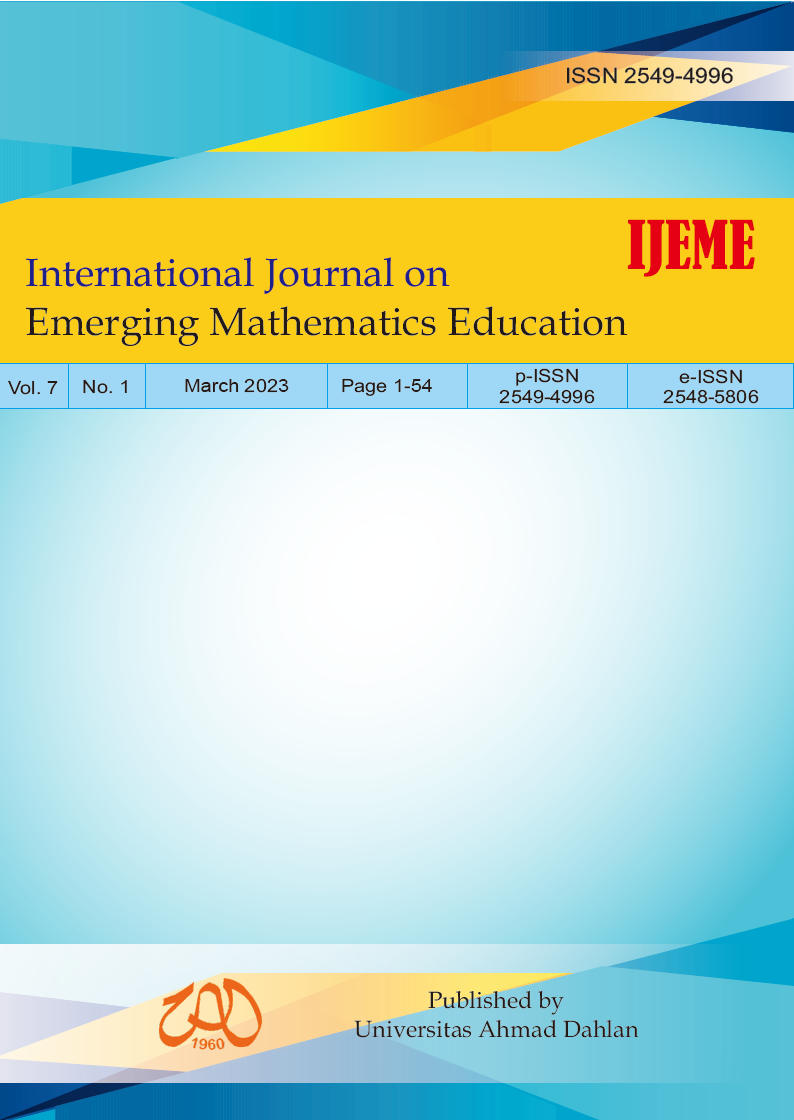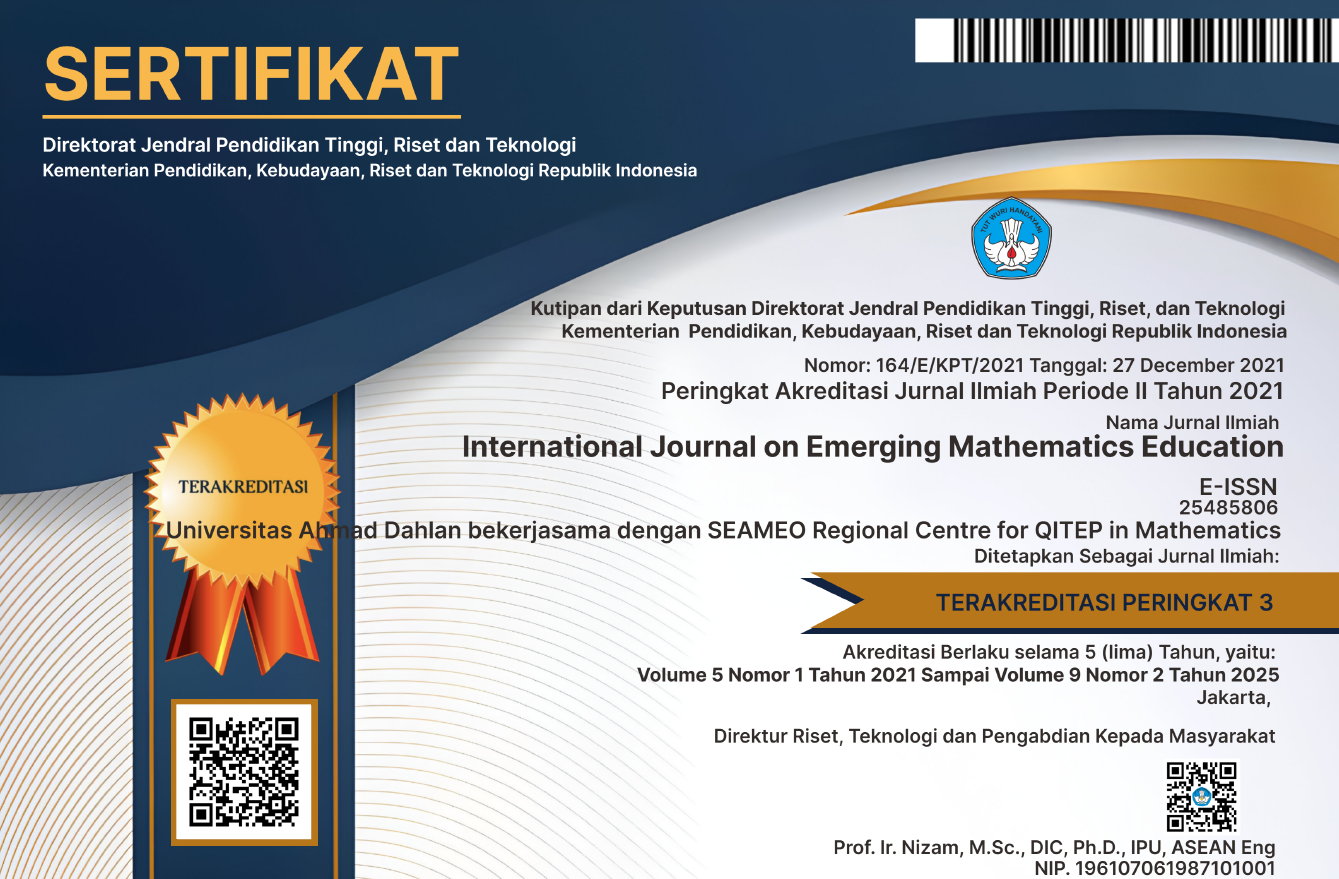Exploring Proficiency of Solving Mathematical Problem Among Mathematics Major
DOI:
https://doi.org/10.12928/ijeme.v7i1.21939Keywords:
path analysis, mathematics performance, critical thinking skills, problem-solving skillAbstract
Learning problem-solving in mathematics was a challenge for both learners and teachers because of its complexity. Development of the skill necessitates understanding towards common observable predictors to depict the viable actions of typical students. This study created a model that determines the predictors' direct and indirect effects on mathematics problem-solving efficiency. It utilized predictive correlation design using multiple regression analysis to examine the hypothesized predictors. Results showed that self-efficacy and English proficiency did not directly influence the ability to perform in problem-solving; analytical-logical does otherwise. Notable findings displayed an inverse relationship of study habits among students. With that, improving analytical-logical skills promotes greater learning along with the development of English proficiency and self-efficacy. Furthermore, the study habits of mathematics majors were not meaningful because of the potential exposure to problem-solving.
References
Beal, C. R., Adams, N. M., & Cohen, P. R. (2010). Reading proficiency and mathematics problem solving by high school English language learners. Urban Education, 45(1), 58-74. Retrieved from https://doi.org/10.1177/0042085909352143
Elliott, T. R., Godshall, F., Shrout, J. R., & Witty, T. E. (1990). Problem-solving appraisal, self-reported study habits, and performance of academically at-risk college students. Journal of Counseling Psychology, 37(2), 203–207. Retrieved from https://doi.org/10.1037/0022-0167.37.2.203
Fernández, L. M., Wang, X., Ramirez, O., & Villalobos, M. C. (2019). Latinx Students’ Mathematics Anxiety and Their Study Habits: Exploring Their Relationship at the Postsecondary Level. Journal of Hispanic Higher Education, 1538192719852205. Retrieved from https://doi.org/10.1177/1538192719852205
Henry, D. L., Baltes, B., & Nistor, N. (2014). Examining the relationship between math scores and English language proficiency. Journal of Educational Research and Practice, 4(1), 2. Retrieved from DOI: 10.5590/JERAP.2014.04.1.02
Hoffman, B. (2010). “I think I can, but I'm afraid to tryâ€: The role of self-efficacy beliefs and mathematics anxiety in mathematics problem-solving efficiency. Learning and individual differences, 20(3), 276-283. Retrieved from https://doi.org/10.1016/j.lindif.2010.02.001
Kitsantas, A., Cheema, J., & Ware, H. W. (2011). Mathematics achievement: The role of homework and self-efficacy beliefs. Journal of Advanced Academics, 22(2), 310-339. Retrieved from https://doi.org/10.1177/1932202X1102200206
Mestre, J. P. (2013). The role of language comprehension in mathematics and problem solving. In Linguistic and cultural influences on learning mathematics (pp. 201-220). Taylor and Francis. Retrieved from https://doi.org/10.4324/9780203056820-17
Peter, E. E. (2012). Critical thinking: Essence for teaching mathematics and mathematics problem solving skills. African Journal of Mathematics and Computer Science Research, 5(3), 39-43. Retrieved from https://doi.org/10.5897/AJMCSR11.161
Rahman, A., & Ahmar, A. (2016). Exploration of mathematics problem solving process based on the thinking level of students in junior high school. International Journal of Environmental and Science Education, 11(14). Retrieved from https://ssrn.com/abstract=2924344
Rahman, M. M. (2019). 21st Century Skill “Problem Solvingâ€: Defining the Concept. Asian Journal of Interdisciplinary Research, 2(1), 64-74. Retrieved from https://doi.org/10.34256/ajir1917
Sangcap, P. G. A. (2010). Mathematics-related beliefs of Filipino college students: Factors affecting mathematics and problem solving performance. Procedia-Social and Behavioral Sciences, 8, 465-475.
Saquing-Guingab, R. (2015). Correlating English Language Usage with Academic Achievement: A Study of Communication Students in a State University in the Philippines. Researchers World, 6(1), 88.
Singh, P. (2016). Study Of Acedemic Achievement In Mathematics In Relation With Study-Habits And Home-Environment. IJISET-International Journal of Innovative Science, Engineering & Technology, 107-119
Suan, J. S. (2014). Factors affecting underachievement in mathematics. Proceeding of the Global Summit on Education GSE, 5.
Tambychik, T., & Meerah, T. S. M. (2010). Students’ difficulties in mathematics problem-solving: What do they say?. Procedia-Social and Behavioral Sciences, 8, 142-151. Retrieved from https://doi.org/10.1016/j.sbspro.2010.12.020
Downloads
Published
How to Cite
Issue
Section
License
License and Copyright Agreement
In submitting the manuscript to the journal, the authors certify that:
- They are authorized by their co-authors to enter into these arrangements.
- The work described has not been formally published before, except in the form of an abstract or as part of a published lecture, review, thesis, or overlay journal. Please also carefully read the International Journal on Emerging Mathematics Education (IJEME) Author Guidelines at http://journal.uad.ac.id/index.php/IJEME/about/submissions#authorGuidelines
- That it is not under consideration for publication elsewhere,
- That its publication has been approved by all the author(s) and by the responsible authorities, tacitly or explicitly, of the institutes where the work has been carried out.
- They secure the right to reproduce any material that has already been published or copyrighted elsewhere.
- They agree to the following license and copyright agreement.
Copyright
Authors who publish with the International Journal on Emerging Mathematics Education (IJEME) agree to the following terms:
- Authors retain copyright and grant the journal the right of first publication with the work simultaneously licensed under a Creative Commons Attribution License (CC BY-SA 4.0) that allows others to share the work with an acknowledgment of the work's authorship and initial publication in this journal.
- Authors are able to enter into separate, additional contractual arrangements for the non-exclusive distribution of the journal's published version of the work (e.g., post it to an institutional repository or publish it in a book), with an acknowledgment of its initial publication in this journal.
- Authors are permitted and encouraged to post their work online (e.g., in institutional repositories or on their website) prior to and during the submission process, as it can lead to productive exchanges, as well as earlier and greater citation of published work.
![]()
Ciptaan disebarluaskan di bawah Lisensi Creative Commons Atribusi-BerbagiSerupa 4.0 Internasional.





